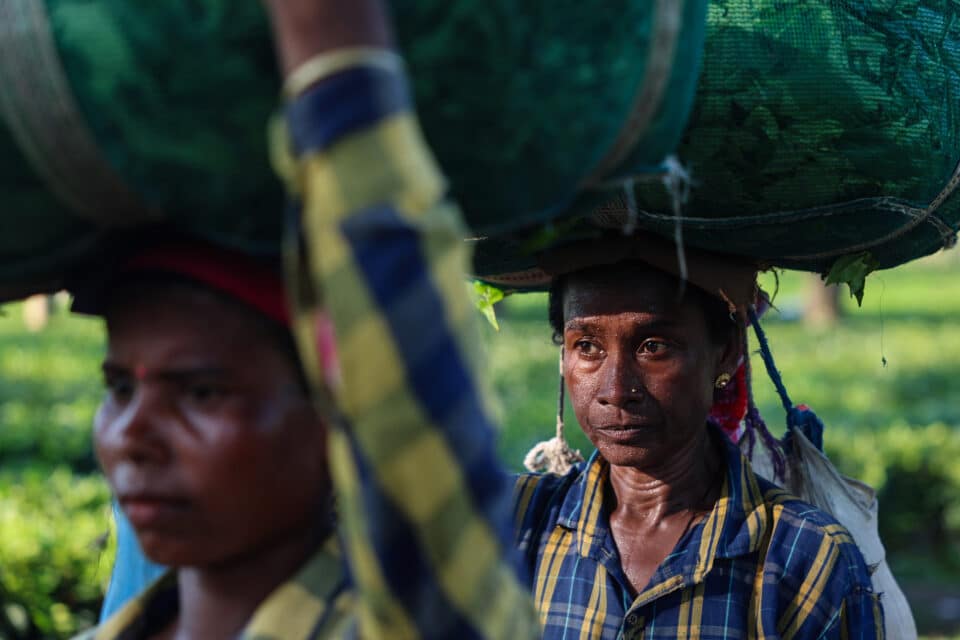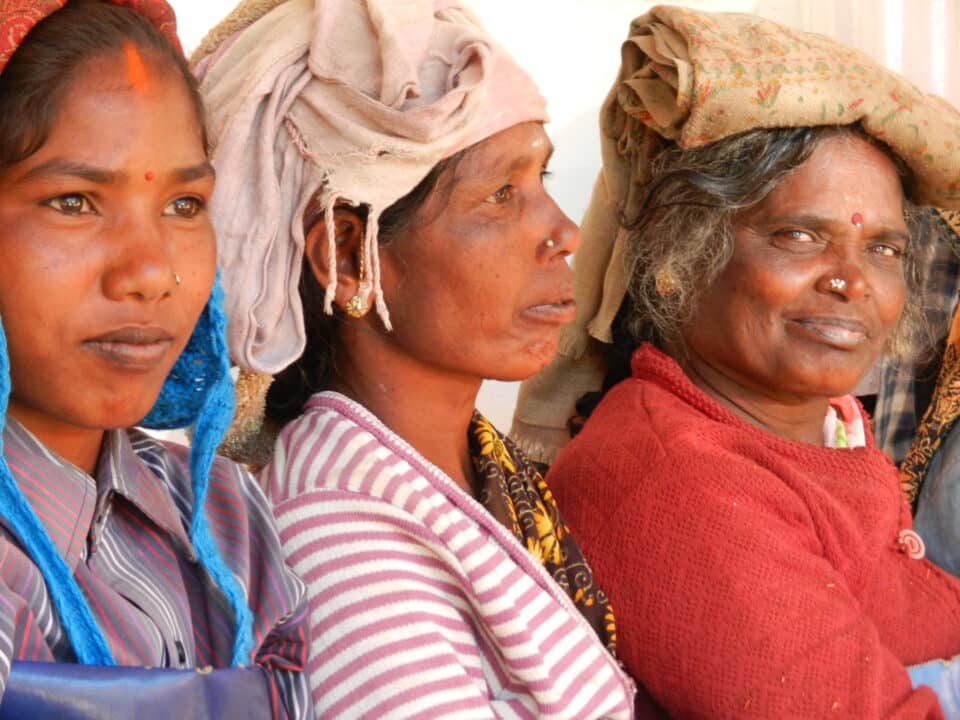The Headlines
This Update covers news items from around the world in May and June 2025. It’s been a busy period for the sector. Many origins are being buffeted by the climate crisis and by the econmic fallout of the conflicts between Israel and Palestine and Iran. This is on top of the industry’s relentlessly ongoing protests against low pay and poor living and working conditions. While every tea origin has its share of problems, it seems that every month brings news of Indian tea workers in particular facing unpaid wages, unemployment due to estate closures, and fatal wild animal attacks… To secure its competitiveness on the global market it needs to get to the root of these issues and resolve them.
But it hasn’t all been bad news these past two months. Several governement, private and third sector initiatives have sought to support and empower tea workers, farmers and their communities through training, land allocation, climate-protection projects and even global momentum to improve tea workers’ wages – an issue that lies at the root of so many of their other problems. A heartening symbol of improvement is the graduation from medical school of the daughter of Indian tea workers, Rupni Minz Oraon, and her employment as a surgeon – demonstrating what is possible despite the odds.
One approach that has long been seen by the wider tea industry as a neat solution to its social and environmental problems has been certification – whether by Fairtrade, Rainforest Alliance or any of the myriad other schemes that promise to verify that tea growers and their environment are protected. But the Kenyan government has pulled the plug on this idea, suspending Rainforest Alliance certification across its tea industry calling on consumers rather than smallholder farmers to bear the costs. Meanwhile several other origins are introducing their own certifications – making the need for a single unifying set of standards even more pressing for confused consumers and overburdened producers.
Explore all these stories and much more below with links to the original media articles from which they are taken. We bring you these news items in the spirit of sharing knowledge, but cannot take responsibility for the accuracy of their contents. Please alert THIRST if you feel that any of the stories below are inaccurate or misleading. Thank you.
Certification under scrutiny as tea producers reassess value and cost
In a move which has sent shock waves through the industry, the Kenyan government has suspended Rainforest Alliance certification for tea factories, citing high costs and minimal benefits for smallholder farmers, particularly as only 8% of its tea goes to the UK. Officials argue that consumers should bear the cost of ethical sourcing and have instigated an inquiry to determine whether it brings any benefits. (The Guardian, 07/06/2025; The Star, 14/05/2025; 10/06/2025). Meanwhile, Fairtrade is urging the United Kingdom to leverage its market power to improve pay and working conditions for tea farmers through stronger legislation (The Evening Standard, 21/05/2025).
In an apparent backlash against certification standards imposed by “Western” buyers, a number of national or local initiatives have emerged. A new initiative in Kenya’s Murang’a County is set to boost the value of local tea by introducing Geographical Indications (GI) for its products. Backed by Equity Bank and the French government, the move aims to protect the regional identity of Murang’a tea in international markets, helping it command higher prices and recognition (MSN, 06/05/2025). They would be well advised to learn from the world-famous Darjeeling tea, which already has GI status, yet is facing threats from climate change, labour unrest and land rights issues. (The Week, 18/05/2025). Sri Lanka is developing a national certification system, supported by Unilever, to enhance the authenticity and global competitiveness of Ceylon Tea, aligning with broader efforts to protect a key export. (Daily FT, 18/05/2025).
Global tea industry balances between climate crisis and innovation
Climate change and environmental degradation are increasingly threatening the global tea industry. “People see the lush green of tea and think life,” says Sri Lankan environmentalist Sajeewa Chamikara, “but it’s often a green desert, sterile for forest species” (The Island, 06/06/2025). Across South Asia, heatwaves, floods, and erosion are damaging estates and endangering livelihoods in Bangladesh (The Daily Star, 04/05/2025), India (Hub News, 03/06/2025; Times of India, 07/06/2025), and China (Sixth Tone, 15/05/2025). Sri Lanka and Kenya are responding with regenerative agriculture, organic methods, and renewable energy initiatives (Daily FT, 24/06/2025; KBC, 26/06/2025) and India is experimenting with rock dust to capture carbon naturally (France 24, 24/06/2025). Kenya is also exploring biomass gasification and low-carbon certification to support smallholders (KBC, 26/06/2025). In Tanzania, extensive soil analysis aims to guide sustainable cultivation (The Guardian, 16/05/2025), while Bangladesh considers repurposing unused estates for eco-tourism and renewables. The FAO warns climate change could shrink global tea-growing areas by 55% by 2050 (Daily Sabah, 23/05/2025).
Unpaid and unheard tea workers bear the brunt of estate closures
Several tea estates across India are facing crisis due to mismanagement, unpaid wages, and sudden closures. In West Bengal, the government has introduced a new process to transfer closed estates to new investors, following abrupt shutdowns at Turturi and Madhu estates, leaving nearly 900 workers jobless (Telegraph India, 03/06/2025; Telegraph India, 08/06/2025). Kerala’s POABS-run estates face potential closure amid five months of unpaid wages (The Hindu, 10/05/2025). In Assam, ten state-run Andrew Yule estates are up for sale due to financial struggles and delayed payments (Assam Tribune, 18/06/2025). Meanwhile, Jaybirpara Tea Estate in West Bengal suspended work citing threats, displacing 450 workers, with unions criticizing the lack of official intervention (Telegraph India, 24/06/2025). And in West Bengal’s Rasikbil area, controversy surrounds a self-managed tribal tea plantation that was reportedly destroyed by government authorities; MLA Sankar Ghosh accused the state of violating the Forest Rights Act 2006 and forcibly evicting tribal families who had cultivated the land collectively for years. (The Statesman, 18/06/2025).
“We cannot survive”: Tea workers rise-up over unpaid wages poor conditions, and long-standing rights violations
Wage protests are intensifying across South Asia’s tea sector. In Sylhet, Bangladesh, 2,500 tea workers blocked a major road after going unpaid for 20 weeks. Many expressed desperation with one worker saying, “We cannot survive without food and water. How long can we endure this?” (The Daily Star, 01/05/2025; New Age, 06/05/2025). They ended their strike after partial dues were paid, while a national conference renewed calls for land rights and an end to discrimination (The Daily Star, 08/05/2025).
At Salmaramukh Tea Estate in Assam, India, workers protested outside the manager’s residence over delayed wages, bonuses, and gratuity, with support from the All Assam Tea Tribes Student Association (Sentinel Assam, 05/06/2025). In West Bengal, INTTUC president Ritabrata Banerjee condemned central government-run estates for irregular payments and failure to deposit provident fund contributions. These events reflect growing frustration over long-standing wage violations and the neglect of workers’ rights in the tea industry (Telegraph India, 28/06/2025). Unions accused estates of Provident Fund law violations (The Statesman, 06/05/2025). Protests in Assam (Times of India, 08/06/2025) and West Bengal demanded wage settlements, housing repairs, and better services (Millennium Post, 08/06/2025). Growing unrest has led to mass demonstration plans across North Bengal as workers continue to press for justice and dignity (UCA News, 02/06/2025).
Tea workers health and living conditions have declined
Even when wages are paid, tea workers and their families are facing challenges in accessing basic services like clean water and healthcare. Over 1,100 tea workers protested in India’s Jalpaiguri on 28 May, demanding clean drinking water in estates housing 850 families, highlighting broader issues like crumbling health infrastructure (World Socialist Web Site, 30/05/2025). Once known for strong medical facilities, many estate hospitals have declined, forcing workers to rely on inadequate public or expensive private care. Amid this, Rupni Minz Oraon, a tea worker’s daughter, became a house surgeon, aiming to improve healthcare access (Telegraph India, 19/05/2025). Meanwhile, women tea workers continue facing harsh conditions, such as wage-related mistreatment when ill. In Bangladesh, an EU- and Oxfam-supported ECDO initiative is training women workers to advocate for their rights and leadership (Sylhettoday24, 26/06/2025). In Sri Lanka, Malaiyaha (“Hill Country”) Tamil workers marched for equal citizenship and fair treatment.
Another ongoing threat to tea workers’ health and safety – particularly in India – is the rising number of human-wildlife conflicts worker was killed by an elephant on 17 May (Prag News, 18/05/2025). At Singri Tea Estate, repeated leopard sightings have disrupted work and prompted safety measures, with calls for quicker wildlife intervention (Sentinel Assam, 24/05/2025). In Tamil Nadu’s Valparai region, a four-year-old girl was killed by a leopard just days after her family arrived as migrant workers (The Indian Express, 21/06/2025).
African tea unions strive against harassment of women
In Kenya, five civil society and women’s groups have petitioned the Kericho High Court to disqualify John Chebochok from the Kenya Tea Development Agency (KTDA) board over allegations of sexual exploitation of female workers during his time at James Finlay Company. These claims, featured in the 2023 BBC documentary Sex for Work: The True Taste of Our Tea, highlight concerns about leadership accountability. A ruling is expected on 24 July (Standard Media, 06/05/2025). Meanwhile, in Malawi, 40 union leaders from PAWU completed a two-day training by the ILO, supported by the ILO-Norway Project, to tackle gender-based violence and harassment in tea and macadamia sectors, strengthening grievance processes and promoting gender equality (ILO, 21/05/2025).
New initiatives supporting and empowering tea workers and farmers
Alongside all the challenges, several positive initiatives are underway in the global tea sector. Global momentum is growing to improve wages and conditions for tea workers. In Tripura, India, the government announced a 16% wage hike—the first since 2018 (Tripura Times, 20/06/2025; Northeast Herald, 20/06/2025) —while Assam workers saw a smaller raise, still below promised levels (Telegraph India, 22/05/2025). A Right to Information request revealed plantation workers have been excluded from Dearness Allowance hikes for over 50 years (The Hindu, 20/06/2025). In Bangladesh, where wages remain extremely low, the Tea Board is pressuring garden owners to comply with fair pay standards (Sylhettoday24, 27/05/2025). International efforts like the Fair Pay Charter and Oxfam’s Model Tea State aim to uplift 50 million workers with fair wages, gender equity, and climate-smart practices (The Business News, 20/05/2025; Macau Business, 24/05/2025).
In Kenya, the Ministry of Education and Lipton Teas have launched a Tea Academy at the University of Kabianga (KBC, 05/05/2025), and the Tea Research Institute opened its 15th Mkulima Shop to support smallholders (Kenya News, 23/05/2025). A new TVET model and a health insurance credit scheme for 650,000 farmers are also being introduced (The Star, 29/05/2025). In the United Kingdom, Sainsbury’s has returned to Fairtrade certification, generating over £1 million annually for tea communities (MSN, 06/05/2025). India’s Assam launched a financial aid scheme for tea workers (Northeast Today, 10/05/2025), Nepal handed over a China-backed tea factory to a local cooperative (The Kathmandu Post, 26/05/2025), and Bangladesh promoted menstrual hygiene among tea workers (Daily Sun, 27/07/2025). In India’s Tripura, tea workers have been granted leased land for permanent housing, a long-awaited step towards greater security for those who sustain the region’s tea sector. (India Today NE, 23/05/2025).
Shifting policies bring uncertainty and opportunity across tea regions
Bangladesh has formed an inter-ministerial committee to address labour issues, promising wage hikes linked to auction prices (TBS News, 17/05/2025; BSS News, 18/05/2025). In India’s West Bengal, while new investments in industrial parks and a Darjeeling tea lab are welcomed, small growers still seek official recognition as farmers (Tax Management India, 19/05/2025; The Statesman, 23/05/2025). Kenya is developing shared packaging hubs to reduce costs (The Star, 23/05/2025), but smallholders remain burdened by high taxes (The Eastleigh Voice, 06/06/2025). Kenya also pledged $27 million to modernise factories and boost exports to China(Ecofin Agency, 20/06/2025).
India faces concerns over low-grade tea imports being falsely relabelled and re-exported (Assam Tribune, 29/05/2025). Positively, India extended crop insurance to tea to address climate risks (MSN, 16/06/2025), and over 3,000 tea worker families received land titles (Northeast Herald, 20/06/2025). Assam has launched an AI and blockchain-powered digital tea auction platform, backed by the North East Tea Association (NETA). This system offers real-time, transparent and tamper-proof transactions, replacing outdated auction methods (Coin Trust, 02/06/2025). A public-private partnership in Sri Lanka has helped over 4,000 smallholders boost tea yields by 15% to 45% in just over a year. (Daily FT, 02/06/2025) The government now aims to raise national tea production to 400 million kg by 2028, with smallholders expected to play a key role in reaching that target (Daily News, 08/06/2025).
Global trade and conflict reshape the tea industry
Morocco has pledged to boost imports of Kenyan tea and coffee, offering relief to East African producers and promoting balanced trade (The Star, 27/05/2025). Rising tensions between Iran and Israel pose risks to tea-exporting nations, especially Kenya (The East African, 18/06/2025; The Star, 23/06/2025) and Sri Lanka (Asian News, 20/06/2025), which rely heavily on West Asian markets. Sri Lanka could face economic strain if demand drops, while in India, falling green leaf prices and export delays caused by the West Asia conflict are hurting small growers. Assam producers now fear oversupply amid weakening West Asian demand (Onmanorama, 25/06/2025; Assam Tribune, 26/06/2025).
China is expanding tea-related partnerships across Africa, positioning tea as a symbol of peace and cooperation. In Nigeria, Chinese Ambassador Yu Dunhai highlighted plans for collaboration in tea trade, agro-processing, and cultural tourism (Vanguard, 25/05/2025). In Kenya, Benny Tea Industries is investing $100 million to modernise tea processing, particularly in orthodox tea for Chinese markets. Chairman Zhang Chaobin met President Ruto to boost Kenyan tea exports to China (Nanyan Technological University, 29/05/2025). Simultaneously, China and Kenya signed 20 cooperation agreements worth hundreds of millions, spanning agriculture, infrastructure, and training. These moves come amid US-China trade tensions that threaten significant losses for Kenyan exports to the U.S. (World Socialist Web Site, 03/06/2025).
This News Update was written by Sarah Amankwah and Sabita Banerji .
Share this update
Sign up for our monthly newsletter to stay in the know about human rights in the tea sector
Each issue of our newsletter includes:
A summary of the latest tea sector news
Upcoming THIRST events
THIRST news and updates
New reports and resources from our Knowledge Hub




